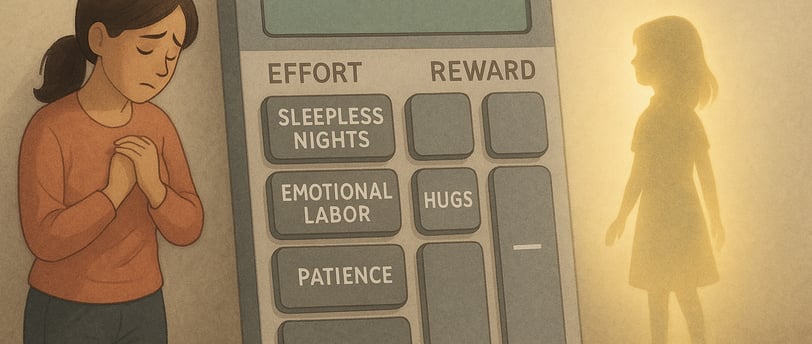The Mental Economics of Parenthood: What No One Tells You About the Cost of Love
PAR-M-ENTAL HEALTH
5/18/20252 min read


Economic Nature of Parenting
As a parent who is responsible for household finances, it’s meaningful to utilize wisdom of economics. Behavioral economics teaches us that the situation where 'efforts go unrewarded' can be the most mentally exhausting. Many parents find themselves in this predicament, tirelessly investing time and energy into raising their children while often feeling like their efforts yield little immediate result. In fact, the final outcomes of parenting typically don't reveal themselves until years later, making the journey feel even more burdensome.
The Weight of Expectations Can Lead to Despair
As parents, we tend to put an enormous amount of pressure on ourselves. Reflecting on my own experiences, I remember vast moments filled with worry and frustration, where the sacrifices I made as a parent seemed to go unnoticed. The lack of tangible results often left me questioning my abilities. Philosopher Søren Kierkegaard once said, "Despair begins with trying to become someone you're not." This resonates deeply with parenting—many of us feel the need to live up to an idealized version of what a 'perfect parent' should be. We forget that vulnerability doesn't equate to failure; rather, it's a testament to our dedication and commitment.
It’s hard to know who I really am during parenting, because becoming a parent gives us a brand-new identity—we’re already “someone we’re not” the moment that role begins. When my daughter was under a year old, I was overwhelmed and desperately searching for tips on how to care for a baby. Parenting was so difficult that I had completely forgotten about myself. I bought a book by Nobuyoshi Hirai, a renowned Japanese parenting advisor, expecting practical advice to help me survive the day-to-day. But the very first line read: “What is your hobby?” It felt like I was struck by lightning.
It was mysterious: after the day I read that line, my parenting began to go smoothly—despite not applying any of the practical tips from the book.
Until then, my thoughts were all centered on her: “What does she need?” “Why is she crying?” “Is she okay with this?”
But suddenly, my inner dialogue had shifted. I started thinking, “What can I offer to meet her needs?” “Is this the best I can do for my crying baby?” “Would I be proud of myself if I did this for her?”
Like Kierkegaard said, perhaps I had been “trying to become someone you’re not.” And without realizing it, I had started to come back to myself.
Your Badge of an Excellent Parent
If you ever feel despair or inadequacy, try to see your vulnerability as a sign of truly excellent parenting. It means you’ve been accumulating efforts that often go unrewarded—quiet, unseen work that only a devoted parent would continue.
You’re on the right track, even when the path feels rocky. My daughter and I eventually saw the best results, and I truly believe you will too.
Ultimately, parenting is a marathon, not a sprint. We may not see immediate results, but trust that the seeds of love, patience, and resilience you're planting today will flourish in time. Become who you really are and allow the person to guide you. You are a fantastic parent, and your journey is invaluable!
Inspiration
Discover beauty and creativity through kaizen. 【YouTube Channel】Japanese Parenting Victory
Harmony of the globe
RhYthm of the universe
© 2025. All rights reserved.
